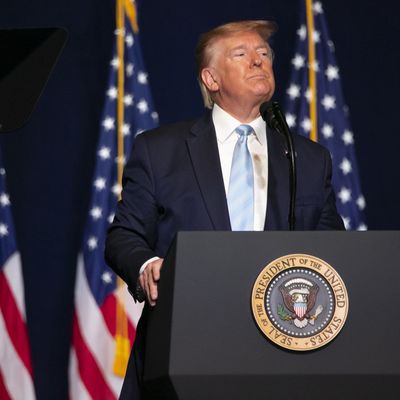
President Trump’s risky escalation of the conflict with Iran has confused many people who took him, if not for a dove exactly, then for a skeptic of wars, especially in the Middle East. The unfolding Iran adventure seems to open once again the question of what principle, if any, defines this president’s foreign policy. Isolationism? Nationalism? Whatever Fox News is demanding at any given moment?
His real North Star is in fact an idea he has explicated many times, but — perhaps because it is so horrifying — even his critics seem hesitant to accept as a true motivation. Trump’s plan is to collapse the moral space between America and its enemies.
The president laid out his logic most recently on Sunday night, when he reiterated his threat to destroy Iranian cultural sites if that country retaliates in the wake of the targeted killing of Qasem Soleimani. “They’re allowed to kill our people,” Trump told the press pool. “They’re allowed to torture and maim our people. They’re allowed to use roadside bombs and blow up our people. And we’re not allowed to touch their cultural site? It doesn’t work that way.”
This is Trump’s deepest belief about foreign policy: The things that separate the United States from terrorists and dictatorships are not a source of strength, but of weakness. Our enemies are stronger and tougher, willing to do the hard things that must be done in order to win. To defeat them, we must become like them.
Trump has long dismissed respect for human rights, international law, and innocent life as a form of political correctness. During the campaign, he promised to kill the families of terrorists, steal oil from countries the U.S. invades, and restore torture. “Don’t tell me it doesn’t work — torture works,” Trump said in 2016. “Okay, folks? Torture — you know, half these guys [say]: ‘Torture doesn’t work.’ Believe me, it works. Okay?”
Trump even laid out his intentions in an op-ed during the Republican primary. “I have made it clear in my campaign that I would support and endorse the use of enhanced interrogation techniques if the use of these methods would enhance the protection and safety of the nation,” Trump penned in a USA Today op-ed, short enough to have plausibly been written by his own hand. “Though the effectiveness of many of these methods may be in dispute, nothing should be taken off the table when American lives are at stake. The enemy is cutting off the heads of Christians and drowning them in cages, and yet we are too politically correct to respond in kind.” Here again is the characteristic assumption in his mind that any distinction between methods used by terrorists and by the U.S. military necessarily means the U.S. has imposed a needless handicap upon itself.
This sort of rhetoric was generally dismissed as campaign bluster. But Trump has increasingly found it within his means to turn his ideas into practice. He has pardoned and celebrated the most notorious war criminals in the U.S. military, opening an avenue for sadistic killers to indiscriminately torture prisoners and murder civilians, knowing they can appeal to the president to escape any accountability for their crimes. It is hardly an exaggeration to say that, in the pardon power, Trump has found a loophole that allows him to negate the entire military code of conduct.
Whether Trump likewise carries out his threat to destroy cultural sites in Iran is obviously an open question. CNN reports that senior officials have registered opposition to the idea, which is not only an unambiguous war crime but a method of war crime closely associated with the Taliban. But the protective cordon surrounding Trump has eroded as his first term draws to a close, and it would be foolish to assume they will necessarily succeed in stopping his latest unthinkable act.
Trump’s disdain for human rights and international law explains his longstanding admiration for dictators. This is a man who 30 years ago criticized the Chinese communist party for waiting too long to suppress the demonstrations at Tiananmen Square, and defended Vladimir Putin’s iron hand: “He’s running his country and at least he’s a leader, unlike what we have in this country,” Trump said in 2015. From the premise that the authoritarians of the world are strong and correct, and its (small-d) democrats are politically correct fools, his broader recasting of America’s alliances makes perfect sense. Of course he would draw the United States closer to Russia, the Gulf States, and the emerging autocrats of Europe, and further away from its traditional Western allies. Why side with the foolish and weak when we can instead cast our lot with the clever and strong?






























